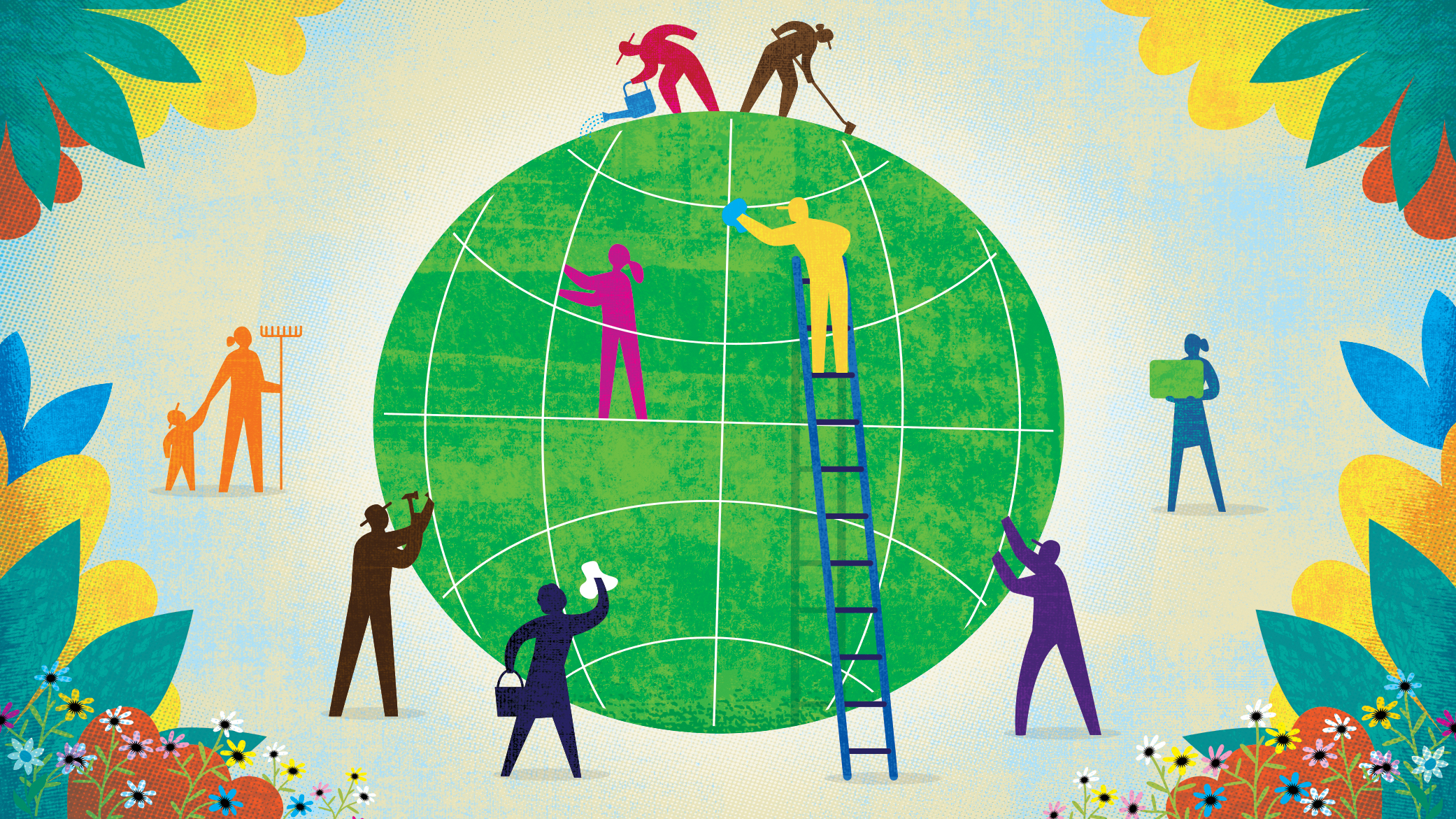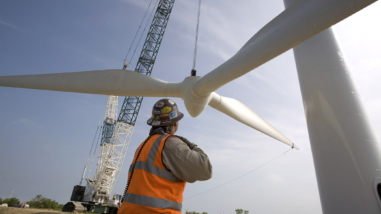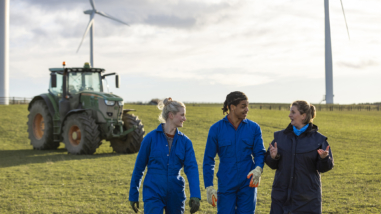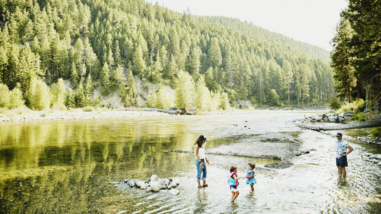Why the United States should build back better: A call for post-COVID, climate-forward policy
 Mike Austin/CCBY-NC-ND
Mike Austin/CCBY-NC-ND
This post originally appeared in Alliance.
The COVID-19 pandemic has been a gut punch to the world. Millions of people infected. Hundreds of thousands dead. Hospitals (again) overflowing. And the effects disproportionately falling on BIPOC communities facing systemic racism and structural inequality.
While this may be a once-in-a-century crisis, it does not stand alone. It is a public health emergency compounded by an unprecedented economic slowdown and a too long delayed racial reckoning. And our vulnerabilities are at least as much social, political, and institutional as they are about our physical vulnerabilities to the virus.
Unless we address these vulnerabilities, we will open ourselves to another threat – and one that is much bigger than COVID: climate change. According to the latest science, climate change will continue to disrupt habitats, and we can anticipate additional pandemic-scale disease transmission to people around our interconnected world. We are already seeing (and expecting more) communities – particularly BIPOC communities – devastated by rising seas, out-of-control wildfires, torrential flooding, and parching droughts.
So, as we respond to COVID-19, we need to intervene in ways that address the underlying sources of our vulnerability in order to create a stronger and more resilient future; in short, we need to build back better. We cannot return to the unsustainable, racist, and inequitable practices of the past if we are to establish both a fairer and more resilient economy and have a chance to avoid the incalculable damages of climate change.
How should we reinvest?
Public recovery investments should maximize public benefit, not just for today, but for tomorrow as well. We don’t have the luxury of time – either for climate or for an equitable recovery – and spending scarce resources without adequate attention to both immediate and long-term needs will waste funds we cannot afford.
We should harness American ingenuity to put people back to work – not in the old jobs that have disappeared; these were unsustainable even before COVID-19. We need to help people get new, high-quality, secure jobs that can build a low carbon electricity grid, revitalize modern American manufacturing, and invest in efficient and energy-saving hospitals, houses, and schools. We should invest in building ports that are clean, so that the communities around them no longer face unacceptable air quality and toxic poisoning. We should replace lead water mains and aging gas lines that poison our communities and explode into fiery infernos. We should build electric vehicles to replace our current fleet and make them accessible not only to the wealthy elite, but to everyone.
We must support innovation, repositioning the U.S. to lead the 21st century with the scientific and technological breakthroughs of the future. We must ensure that the infrastructure of the future, built by workers reflecting the diversity of our nation, is constructed with low-carbon materials and enables low-carbon lifestyles, and that it is resilient to future extreme weather and climate-related events. We need to support our agricultural communities by promoting best practices and technologies that reduce pollution while increasing crop yields. We need to put people to work managing the landscapes that are so central a part of the American identity: building back our national parks, managing our wildlands, and preserving species in the face of increasing threats from wildfire and erosion and encroachment.
The list of what to do is well-established. Until now, we have not mustered the political will to enact these polices and take these measures. But the current, compounded crises of Covid, economic shock and racial injustice, offer a chance to get it right. And if we do so, we will see benefits accrue to us all – and perhaps most importantly, to those BIPOC communities who are most vulnerable and continue to be subject to systemic, societal discrimination.
What does this mean for philanthropy?
Philanthropy has played an historically significant role in cultivating new ideas, supporting policy design, and developing solutions across a range of issues, from civil rights to education to clean air and water. Now is the time to do so again – and the stakes could not be higher.
Philanthropy can step up its contribution in several ways. As an immediate priority, funders should support an ecosystem of institutions at the local, national, and international level to do the analytic work to understand the intersections between economic recovery and building longer-term climate resilience, including a particular focus on racial equity. Grantmaking resources must be targeted at generating ideas for how our investment can create good, well-paying jobs, benefit community resilience, and support equitable growth — not just this year, but over long timescales.
Philanthropy can support a host of specific projects. We can support communities working to replace dirty coal plants with clean electricity. We can support training and policy design to help government and the private sector generate new jobs in building efficiency and urban redevelopment as well as sustainable farming and forest management practices. As the government devotes recovery money to rebuild our decaying infrastructure, philanthropy can support groups ensuring those funds are properly invested in ways that benefit diverse communities. We can work with BIPOC-led organizations, including in communities who strongly support and can help drive climate solutions, but aren’t always at the table – those who are bearing the brunt of the COVID impact and will be similarly at the epicenter of climate damages. And we can work with labor and business coalitions to create appropriate enabling conditions for a clean, durable and environmentally sound growth. At Hewlett, we are supporting nonpartisan groups such as the Equitable and Just National Climate Platform, BlueGreen Alliance, and the Labor Energy Partnership, who are doing work to understand how smart, climate-friendly recovery can create family-sustaining jobs and drive broad and equitable growth.
Funders are also well-positioned to support grantees calling for robust accountability. For example, we can fund organizations working to ensure that recipients of taxpayer-funded relief measures are delivering long term public benefits (e.g., not bailing out companies that are large polluters unless they commit to reducing their climate footprint, and/or demanding equity stakes in companies receiving substantial direct investment). Groups like Evergreen Collaborative and Data for Progress, which we have supported, are developing and proposing these kinds of accountability structures and examining their popularity among voters, and there are important opportunities to advance this agenda moving forward.
In the private sector, we must work to disincentivize risky investments that increase emissions, and bolster those that put us on strong footing for the future. That includes support for BIPOC-led and owned companies working to promote sustainability, working with retail banks to broaden the scope of their green portfolios, and targeting passive investment algorithms that undermine our efforts for a climate friendly future. Thanks to both philanthropic support and public-private partnerships, we have internationally agreed methodologies to assess corporate performance against climate risk (provided by the Task Force on Climate-related Financial Disclosure, TCFD, which we have supported at Hewlett). Our philanthropic dollars should be targeted at helping all companies change their practices and implement the TCFD guidance as one means to help manage corporate risk.
These are dire, uncertain times. People are anxious, with good reason. They are grieving. But we will get through this. But even as philanthropies everywhere seek to alleviate the immediate need, we should keep our eye on the long term and take action now to mitigate the looming disaster of global climate change. And if we go into the recovery with the right goals, listening to and elevating the right set of voices, and prepared to make the choices that are up to us, we will come back stronger and better. We can build a world we want to live in and a future that will be brighter for us all.



